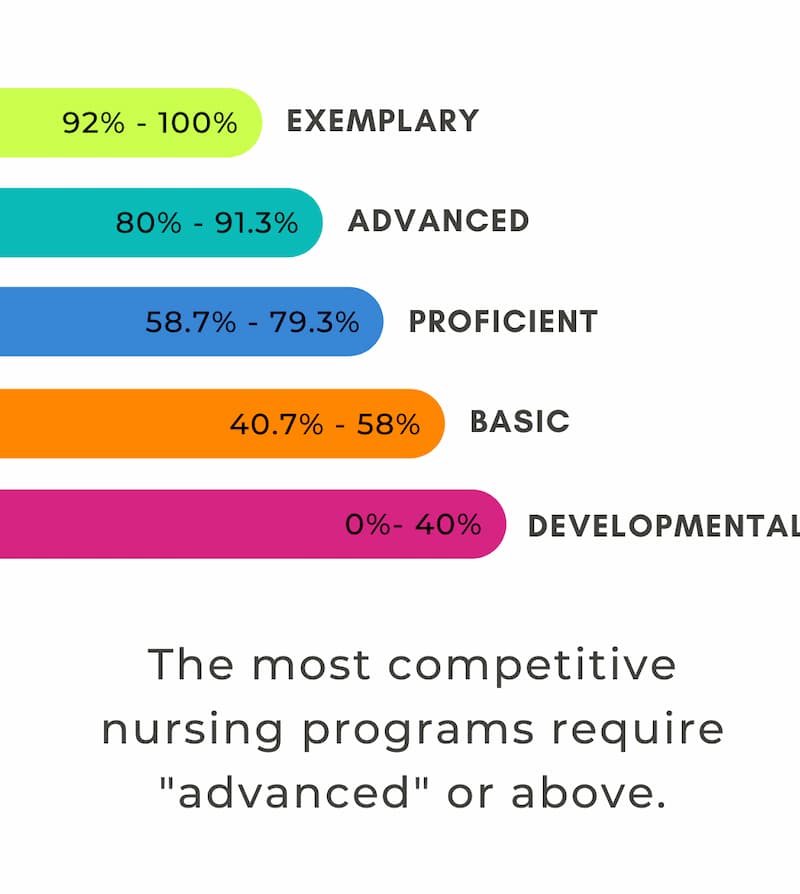Introduction
Understanding TEAS test score interpretation will help you prepare for the exams and improve your chances of passing. A good score demonstrates your readiness for these programs’ academic requirements, increasing your chances of admission. This article will cover how to interpret your TEAS scores and how they affect your nursing school application. You will also discover hacks to improve your TEAS score for nursing school.
Understand TEAS Test Scoring
Your TEAS exam score is crucial to your admissions success. But how does the TEAS exam generate your score results? You will receive a score report with your findings, the same as you would for other academic assessments. The information in this report will assist both you and educators in determining whether you achieve certain educational goals, but it may appear complicated at first.
1. TEAS Test Score Report
Your TEAS exam score report will contain four major areas:
- Total Score
- Content Area Scores
- Sub-content Area Scores
- Percentage compared to other pupils
The Total Score is calculated based on your overall exam performance, determined by the number of accurate answers you provided. However, it has been tweaked so that each test version yields comparable results. The Content Scores are calculated based on your performance in each principal component.
Like the Total Score, it is updated for more accurate comparisons across several exam editions. Sub-Content Scores emphasize individual skills in each section. For example, the Reading Section has the following sub-content areas:
- Key Ideas and Details
- Craft and Structure
- Integrating Knowledge and Ideas

Sub-content scores are also calculated using the correct number of questions. Unlike the other two areas, they are not modified to accommodate variations in test versions. The report also shows how well you scored compared to other participants, with a percentile rank ranging from 0 to 99. For example, you may outperform 75% of the other pupils. This TEAS score for nursing school compares you to both national averages and students in your specific program.
2. Percentage Scores
Scores range from 0 to 100%. Although the amount of questions you answer accurately determines your score, not all questions count. The complete TEAS exam has 170 questions. Only 150 are scoreable. The unscored questions are organized as follows:
- Math: 38 total, 4 unscored.
- Science: 50 total, 6 unscored.
- English and Language Usage: 37 overall, 4 not scored.
- Reading: 45 total, 6 unscored.
You cannot distinguish between scored and unscored questions on the exam. Therefore, do your best on each question. You will not receive partial credit for partially accurate answers.
3. TEAS Test Score Interpretation Preparedness Levels
Your score also indicates your academic preparation level. These levels are broken down into percentage ranges:
- Developmental: 0-40%
- Basic range: 40.7% to 58%
- Proficient: 58.7%, 79.3%
- Advanced range: 80% to 91.3%.
- Exemplary: 92% to 100%.
Colleges and institutions may include this score range in their requirements. For example, they may require a Proficient score (58.7% or higher) for admission consideration.
Understanding the scoring scale is crucial for every TEAS candidate. With the scoring systems, candidates can accurately pinpoint their strengths and weaknesses, focusing their efforts on their weaknesses. Assessing the test scores also allows students to benchmark themselves and set realistic goals. By understanding the proficiency levels and passing scores, candidates will prepare a robust strategy to meet the standards.
How To Interpret Your TEAS Scores
The TEAS test provides various scores, including Content Area Scores, Adjusted Individual Scores, National Mean Scores, Sub-content Area Scores, Program Percentile Rank, and National Percentile Rank. Adjusted Individual Score covers the overall score based on the candidate’s performance in the four test sections. The score determines the fail or pass decision and could be adjusted to ensure comparability and fairness across the different exam versions.
The Content Area Scores showcase the performance in the individual main sections of the TEAS test. At the same time, the Sub-content Area Scores show a more detailed performance breakdown and highlight the particular skills in every section.
The National Mean Score is taken from candidates nationwide and compared against an individual’s score. Conversely, the Program Mean Score is the average total score of all candidates in a given program type. The scores provide the context for the individual’s performance and can be very helpful compared to other TEAS test candidates.
The National Percentile Rank is a percentile rank between 0-99% that shows the percentage of candidates that got lower grades than you. The score compares you to the students in your specific program and national level. Interpreting the TEAS scores regarding readiness and proficiency requires using the ATI academic preparedness levels. These levels are divided into percentage ranges:
- Developmental 0-40%
- Basic 7-58%
- Proficient 7-79.3%
- Advanced 80-91.3%
- Exemplary 92-100%
The levels indicate one’s preparedness level to help understand whether they are fully prepared. Comparing yourself to the program-specific and national averages offers valuable context for your performance. For instance, the average TEAS scores are between 65% and 75%, which is Proficient. If this is where your score lies, you are not badly off.
Implications for Your Nursing School Application
TEAS scores are vital in admissions to nursing schools. They assess the candidate’s academic readiness to pursue nursing as a career. Almost all nursing programs will have a minimum admission score, which may differ depending on the institution and program type.
For example, the BSN programs have a minimum of 70% TEAS score, while the ADN program could have lower score requirements. Also, some institutions could consider other factors such as volunteer experience, GPA, and personal essays alongside the TEAS score.
Note that nursing programs are usually highly competitive and offer limited opportunities for entry. That means achieving the minimum TEAS score may barely be sufficient to grant you a position in the niche. You could consider combining a high TEAS score with a high GPA or submitting a solid personal essay.
How To Analyze Your Score Report
This score report gives you a simple breakdown of your performance in every test section, allowing you to assess where you outperformed and where you need more effort. Your TEAS exam scorecard summarizes everything the assessment uncovered about your readiness for nursing school. Interpreting your achievement’s percentages and graphs can be daunting.
To evaluate your TEAS test result report effectively, you must first grasp its components and what they signify regarding your performance.
1. Composite Score
The composite score is the total of all four areas of the TEAS test: reading, math, science, and English. It provides a fast overview of how well you performed on the exam. However, it does not cover the entire tale. Look at the sectional scores to see which questions were the most challenging for you.
Different schools or programs may have minimum composite score requirements. Check with the nursing schools you are applying to be sure you meet their suggested entry score. The TEAS does not have a standard passing score, and nursing programs specify the level of academic readiness that students must achieve.
2. Sectional Scores
The report’s sectional scoring element divides your performance into specific subjects. It shows where you had difficulty in case you need to repeat the exam to improve your marks. These scores can help you determine your strengths and shortcomings. Some programs may focus more on your performance in specific areas, so remember this when analyzing your grades.
3. Scaled Scores and Percentile Ranks
One of the most challenging aspects of reading the TEAS test score report is deciphering scaled scores and percentile rankings. Scaled scores are modified to provide fair comparisons between test versions. They usually range from 0 to 100. Percentile ranks represent the percentage of candidates who scored lower than you.
For example, a percentile rank of 75 indicates that you scored higher than 75% of the candidates. This information is helpful to know whether your scores are considered competitive. Nursing school admissions are pretty tricky. State and community universities are frequently the most competitive since they are less expensive.
4. Identifying Weakness Areas
The Topics to Review section is one of the most essential elements of your TEAS test scorecard. It is divided into four subject areas. Each academic topic lists issues you addressed incorrectly in the exam.
Each incorrect question is accompanied by a detailed discussion of which objective it falls under. You will not see the question that you answered incorrectly. However, the section provides enough information to help you target and focus on the topic when studying for your retake exam.
Next Steps for Improvement
From your TEAS score analysis, you can implement various strategies to improve in the areas in which you failed. A targeted study plan based on the score analysis will help you retake and pass the test. Here are effective strategies to apply:
- Practice time management. Use effective time management strategies, such as answering the easy questions first and returning later to tackle the challenging ones.
- Identify weak areas—use assessments and practice exams to identify your weaknesses and focus on them before the test day.
- Read to understand the questions. Avoid scheming through the questions; read to internalize and understand what they ask you to do. You could read the questions twice or even three times.
Additional Study Materials
To improve your TEAS score for nursing school, you can also employ some materials for practice, such as:
- Online resources – look for online practice tests, study guides, and resources that review content areas to enhance your understanding and critical thinking skills.
- Official TEAS study materials—you could also use materials from the official ATI website, such as the online practice assessments or the TEAS study manual.
You will also need a targeted study plan based on your score analysis. The score will allow you to pinpoint your strengths and weaknesses and create a plan focusing more on the weak areas.
The plan should also help you manage time effectively and use relevant resources to help you pass and comprehend the TEAS test score interpretation. A targeted study plan will focus on areas that need improvement and less on solid areas, improving your overall TEAS test scores.
How To Meet Program Requirements
Before taking the TEAS test, you must check the requirements to determine eligibility. You could contact the admissions office for the nursing programs and inquire about the minimum standards and score expectations. Attending information sessions, whether virtual or in-person, is another way to learn about the TEAS score thresholds.
1. How TEAS Scores Could Vary Between Different Institutions
Understand that the TEAS scores threshold may be different for different institutions. Nursing programs have varying expectations based on the type of program, historical applicant tool, and competitiveness. Institutions also set minimum requirements based on available resources, program reputation, or accreditation. Some programs may prioritize TEAS scores over other factors like experience or personal statements, while others will not. All these show minimum TEAS scores across institutions.
2. How To Retake the TEAS Test
Supposing you failed the minimum scores required by your ideal institution, you can always retake the test if you meet the program criteria. Here are some helpful tips on how to prepare to retake the exam:
- Utilize available resources
- Identify your weak areas and work on them
- Create a robust study plan
- Practice regularly
- Consider timing yourself
- Monitor progress
Conclusion
Interpreting TEAS test scores is paramount and an essential aspect of excelling in nursing. Comprehending score reports such as proficiency levels, percentile rankings, and content scores gives insights into one’s academic readiness to join a nursing school and guides one in strategic preparation efforts.
By assessing your TEAS scores, you will understand your weak areas and put more effort into understanding those challenging concepts. Also, do thorough research when looking for your ideal institution. The minimum requirement for the nursing course may differ from one institution to the other.




